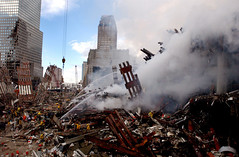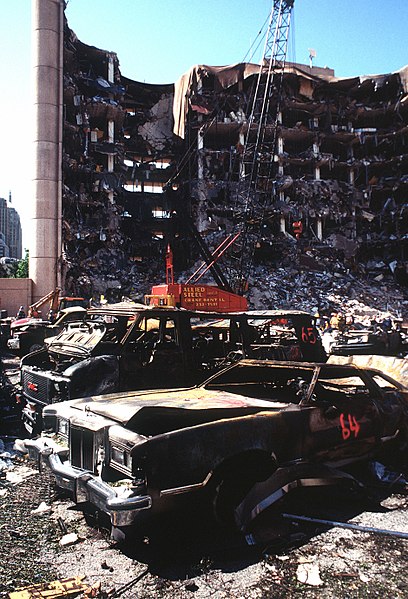For a previous generation the question was 'where were you on Dec. 1, 1941?' For this generation it is 'where where you on Sept. 11, 2001?'
 |
| NYC - 911- DOJ- Public Domain Image |
"Did you hear about the plane?" was what the third staffer, a shelving clerk asked as she came in about midway through the process. "A plane crashed into a building in New York City."
I turned on the sound system because it had a radio unit and we listened as the story was repeated of a this terrible accident, so much like one just a few years before, and then all work slowed as the story shifted to something that was not an accident.
 |
| 1995 OKC Bombing - Public Domain |
On that morning, the group crowded around the doors waiting for us to open numbered over twenty. As the doors opened they pushed in and were soon joined by others. All had a single purpose and voiced it the question, "What more do you know about this thing in New York?"
I hurried to the store room and pulled out the cart with the television on it and set it up in the library so people could watch the coverage. Reception was always poor in the brick building but no one seemed to mind. I had been in this place before; on April 19, 1995 I had been in a school library in Norman, Oklahoma beginning the day,preparing for teachers and students, when the ground shook. Turning on the television in the media area to see if there had been a plane crash or explosion the opening acts of the Murrah Federal Building Bombing commenced.
Now, on this September morning the same silence overladen with uncertainity, horror and fear rode the air. People clustered around users -against library policies against sharing computers - but they were all looking at the same things: news pages and feeds. Every tiny crumb of information was sought, discussed and passed on.
People missed busses, called in late to work, and grew frustrated as the Internet feeds began to go away. They were slow to understand the network connections lost in the fall of the twin towers. The Internet was just always - there. Now, it was not. Systems were overloaded, rerouted, and the same news repeated, speculated on, and reviewed.
Still, library staff worked hard and long to help people meet the new and ever changing information needs of a troubled and challenging situation.
Over the next 48 hours as people began to understand the alleged hijackers had all been muslims, there was another kind of fear. Local muslims and black muslims were afraid to come to the library. They called the reference desk and sent us emails with questions. We sent books, magazine articles, and information to their homes using the postal service.
There was a lot of fear during those days and a lot of finger pointing. There was also a lot of courage, unity, and commitment evidenced by people. In the face of a terrible attack on the nation, on a sea of uncertainity all around them as to the next thing that might happen, they choose to stand as American citizens. They were not African-Americans, Asian-Americans, Hispanic-Americans, or Native Americans. In those bleak days, as so many wept and searched for those who would not be found, they stood simply as Americans.
As Americans they called for sense, caution, for bravery, for courage, and most of all for the unity which defined us as citizens of the United States.
9-11 was the worst disaster, but every year in every library staff prepare for the worst. They post information, they add materials for planning to remain safe, or instructions for handling disasters of both manmade and natural origins. They connect the citizen to community and government agencies, information, and resources every year. Libraries became sites for counseling, information and resource sharing, response training and so much more.
The lesson I learned on 9-11 was that the library is there for people to find out what is happening, to find out why, and to learn how to handle the changes with knowledge.